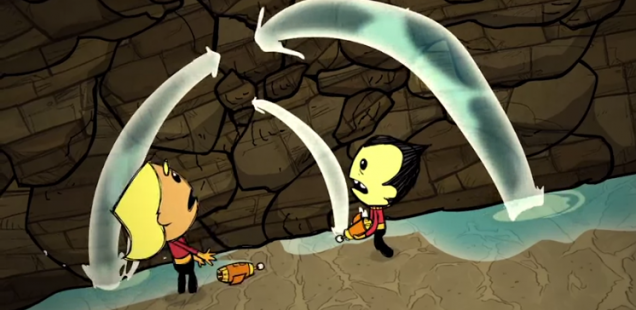
How Oxygen Not Included Taught Me Environmentalism
Branden Lizardi stewards a rocky little world.
This world is a complex place. It’s full of dynamic ecosystems, varied resources, and complicated physics. For every aspect that works in our favor, there are three more that could easily spell out death and disaster. But somehow, its people thrive. Against all odds, we make the most of what we have and use it to progress further than ever before. That progress comes with a cost, however. The longer we go, the more havoc we wreak. And with each passing cycle, we grow every closer to the day that all hell breaks loose and our hubris comes back to destroy us all. And, frankly, we only have ourselves to blame.
Then we’ll have to start a new game.
I’m talking about Klei Entertainment’s Oxygen Not Included, a space colony management game. Here, the player must manage a collection of workers as they scramble to build a habitable base underneath the surface of a procedurally generated asteroid. The player must consider all aspects of immediate and long term survival, including ensuring a healthy supply of oxygen. These workers need to stay comfortable and well cared for, which can be hard in the harsh conditions they’re stuck in. But it’s still not that simple. This world has a surprisingly complex set of interconnected scientific concepts, including fluid mechanics, chemistry, and thermodynamics.
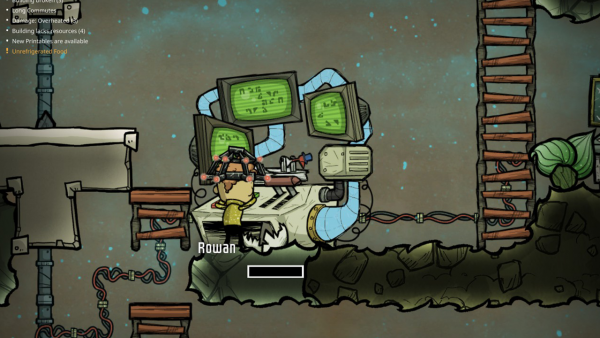
Unsurprisingly, I’ve had a fair few colonies of mine all collapse due to a single overlooked problem or ignored issue. Sometimes it’s food shortages. Sometimes it’s due to power failure. Each one had a strange sense of familiarity to it, prompting an “I knew this would happen, why didn’t I expect it?” in the back of my head. After over 200 hours of play time, I noticed an interesting trend with each catastrophic failure. I HAD seen them all before.Each problem I faced was something that was happening in the real world.
Real-life environmental issues were being reproduced through Oxygen Not Included’s game mechanics. Whether it be an abundance of greenhouse gases, rising environmental temperatures, or depleting non-renewable resources – my mistakes led to the same ecological fallacies that the human race has already seen.
Example 1: Dependence on Non-Renewable Energy
In Oxygen Not Included, one of the most popular forms of power generation is the Coal Generator. It produces notably more power than the alternative of having a worker run on a giant hamster wheel, it can operate independently, and it’s fueled by an extremely common resource: coal. I had two generators running and it was more than enough power to allow me to advance and expand. I built more, accomplished more, and, in turn, used more power. But my excessive watt-based lifestyle eventually caught up to me: I had mined out the last remaining coal vein on the asteroid I called home.
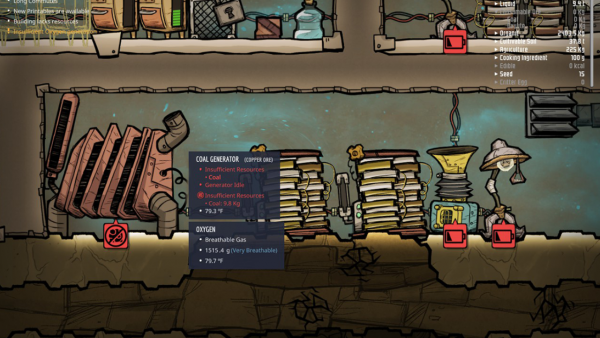
If you lived through the early 2000s, you probably heard at least one article, documentary, expose, or news segment about mankind’s usage of fossil fuels like natural gas, oil, and coal. In short, scientists were concerned that we were using more of these fuel sources than is sustainable. They were worried we would run out and face a power crisis. Their distress continues today: according to an article published by the Stanford Biology School of Sciences in 2019, they estimate that we will run out of coal on Earth by 2090 and oil by 2052. With fossil fuels responsible for a majority of the world’s power generation, this gives us a relatively short time limit to fix the problem.
Looking to the real world helped me realize the answer to my problem. I needed to invest more time and resources into renewable energy, ideally before I was already facing a power crisis. Since hydroelectric and wind generation aren’t available in the game, that left me with geothermal and solar power. Below the ground, I established a system of steam generation, heated by the molten core of the asteroid and used to run a steam generator. On the surface, I built a series of solar panels to gather power during the day. And just like that, I had established a fairly regular supply of energy without fear of it suddenly running out. If I was a wiser man, I would have done this sooner. I could have avoided several stressful cycles of red alert and the large, looming cloud of carbon dioxide that had developed when I wasn’t looking.
Example 2: Greenhouse Gasses and Climate Change
Carbon Dioxide, known by the chemical formula CO2, is one of the most problematic gases there is in Oxygen Not Included. Massive quantities are generated from both the workers’ breathing and from the machinery they use. Unchecked coal generator rooms will often fill with the unbreathable gas, creating an uninhabitable environment. And if these rooms aren’t sealed and isolated, the problem will worsen as it spreads from room to room. The gas is a terrible thermal conductor, so any heat in the area is held in, slowly turning my colony into an oven. Managing CO2 levels requires an active effort toward both removing existing CO2 levels and minimizing future CO2 output, lest it overtake your colony and suffocate its inhabitants.
CO2 is an extremely problematic gas in the real world as well. I heard the term “greenhouse gas effect” constantly through my younger years. But that doesn’t mean I really understood it. I knew it had something to do with all the CO2 that mankind was generating and was the basis for emissions standards on machinery. It was only with a bit of research that I realized how closely it relates to the issue I was having with my digital colony.
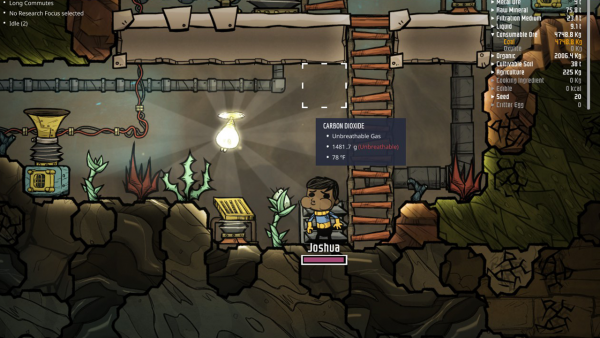
According to NASA, Earth gets much of its heat from solar radiation which in turn is radiated back out into the cosmic vastness of space. This system allows the planet to maintain a temperature that can sustain human life. The greenhouse gas effect is when a layer of certain gases, such as CO2, form in Earth’s atmosphere. These gases don’t transfer heat as easily as oxygen does, acting like a thermal blanket. It eventually reaches a point where Earth is taking in more heat than it’s letting out. This results in heat accumulating over time, raising the ambient temperature in what’s called Global Warming.
The ideal answer to dealing with greenhouse gasses is to not generate them in the first place. If You can’t succumb to something that isn’t there. Reality is less cooperative, however. The real world already has a greenhouse gas problem and many Oxygen Not Included players might have no choice but to use the fuels available to them. In both cases, the problem can be solved with a bit of effort and a healthy amount of precautionary foresight. The people of Earth are developing technology that can extract the CO2 from the air and cultivated plant life ideal at consuming the gas. Oxygen Not Included offers both of these options to its players. The key is to invest in these ideas before the problem reaches a point of no return.
Example 3: Diminishing Food Supplies
My last example was actually the first thing to ever bring my Oxygen Not Included colony to complete collapse. I was young and naive, making my first attempt at survival (meaning I had yet to solve the ongoing heat problem previously described). As time passed, my base grew a little hotter and hotter. Eventually, the crops I used to feed workers couldn’t survive the rising temperature inside my agricultural center. All of a sudden, my primary food production came to a complete halt. If I didn’t find alternative foods or a way to cool off my base, my people would starve. And starve they did.
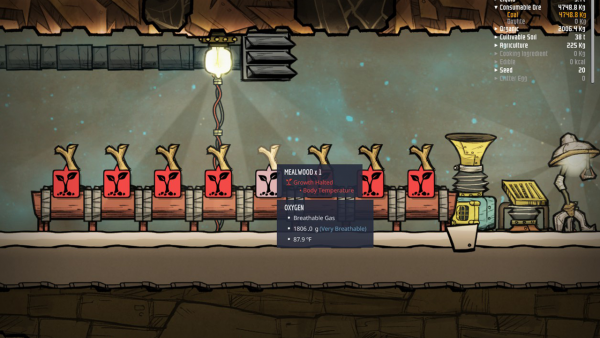
Unfortunately, the same is happening in real life. The Earth is already getting hotter. All those greenhouse gases are already up there and we’re really not making much progress on reaching zero emission operations on a global scale. We’ve already been seeing what exactly this means for the biological life on the planet. Alaskan cod population are at record lows, resulting in the closure of major fisheries that once provided a staple source of meat. Crops and other harvestable plants that once grew in abundance are dwindling. Established farmland is being flooded by the rising sea levels thanks to the polar ice caps gradually melting away. Other plots of land are drying out due to higher temperatures and increasingly scarce rainfall. The Union of Concerned Scientists are worried that a sudden loss of food will happen to humans here soon. Lost land will remain lost, even if we manage to slow the change in climate. Should things continue along their current course, it’ll make it harder and harder to grow food. Eventually, there won’t be enough.
Like before, the ideal solution would be to not let it happen in the first place. I’m fortunate, in that the world in Oxygen Not Included exists on a smaller scale that can be more easily salvaged. Once my base was at a safe and regulated temperature, food supplies were able to maintain themselves and even thrive. Earth isn’t so lucky. Much of the damage done cannot be recovered. But precautionary measures can help prevent further irreversible damage, if we start making the effort now. It’s like the old Chinese proverb, “The best time to plant a tree was 20 years ago. The second best time is now.”
I’m Not Alone
Much like in the real world, I’m not the only person who experienced similar issues to these. Countless other players have seen their colony fall before them. Take Reddit user DentonX12 for example, who suffered mass starvation after the rising temperatures caused their farms to collapse. User ShotokanPanda experienced the same dependency on fossil fuels when their natural gas supply stopped. The resulting power failure led to their oxygen generation and food supplies falling apart.
“Didn’t know about the dormancy mechanic for geysers so when the natural gas stopped, I had to madly scramble for the last bits of hydrogen on the map as my [workers] dropped one by one due to the lack of oxygen and food. I’m so sorry Bubbles…”
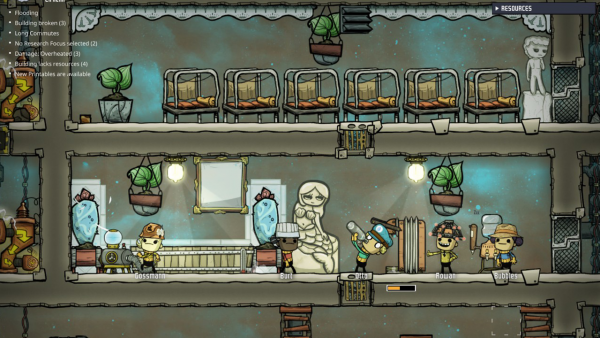
The consistency in which these issues would appear within the player base reinforces the idea that these disasters were more than coincidental outcomes. Everything happened exactly as it was supposed to. Players that manage to avoid the problems do so through either first hand experience or through the wisdom of the community. In real life, we don’t have second chances. Earth is our one and only save file. We as a society can’t rely on past experience in order to do better the second time around. So if we want to combat these real-life problems, we need to work together and heed the wisdom of those who specialize in these matters.
How Oxygen Not Included Taught Me Environmentalism
I never considered myself an environmentalist. I haven’t petitioned to save the trees or protested against big oil. I still don’t, really. I was, and still am, just some guy that plays video games. But I’m also a lot wiser now. I understand why people are petitioning and protesting. I understand that the things causing all of these problems happening in the real world aren’t just appearing from nowhere, but that they are the result of a complicated set of rules and systems. With that understanding also comes the knowledge that these issues could be resolved if we put the time and effort into finding solutions to them.
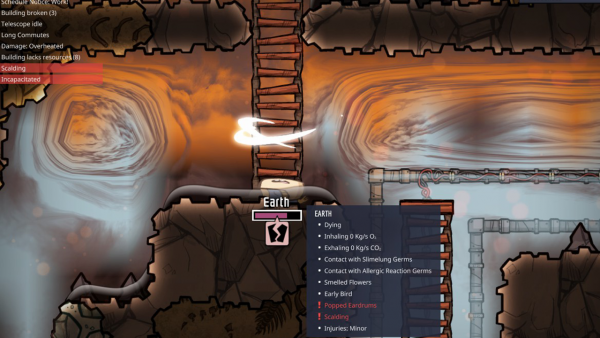
I learned about all of these issues because, without realizing it, I had encountered them first-hand. I had spent hours racking my brain over the logistics of converting to solar energy before the coal ran out. I had restarted entire games, paying special attention to developing climate controlled farming quarters. I was too busy having fun with a video game to notice that I was learning.
It doesn’t end here, either. As complex as the environments are within Oxygen Not Included, the science of the real world shadows it with ease. In my personal game, I was able to solve my excess CO2 problem by venting it and other undesirable gasses to the surface and out into the vacuum of space. Since there’s no atmosphere on the surface, gasses vented into it are, for all intents and purposes, destroyed. This may have worked for me but I am reasonably confident that the same idea wouldn’t hold up in the real world. But just in case, I’ve already emailed Elon Musk about the vent idea.
I still have a great deal to learn if I want to properly understand the situations we’re in and how to best handle them. Such insight can be overwhelming, even stressful. All of this knowledge is a burden.
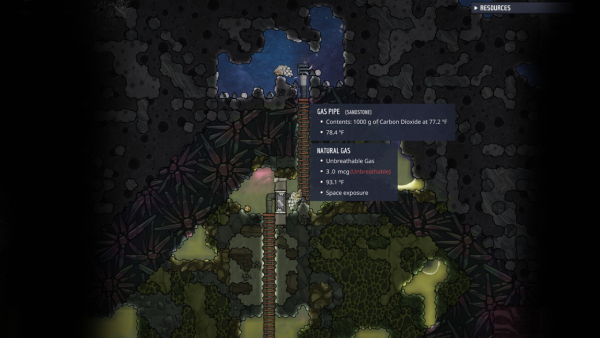
But I’m thankful, all the same. Oxygen Not Included made me so much more aware of the problems we’re all facing. It helped me understand how these issues began and how we might prevent them from getting worse. It opened my mind to the complex nature of my own celestial home, inspiring me to learn more. And it managed to do all this without me realizing it. I had swallowed the proverbial dog medicine of truth, wrapped in the tasty peanut butter coating of video game entertainment. My only hope now is that it manages to do the same for everyone else.
Branden Lizardi has a more laid-back approach to gaming, preferring virtual reality to competitive action. He mostly reports gaming news as a freelancer but still finds time to write for his own site, thelizardrock.com. He can be found on Twitter at @_LizardRock.